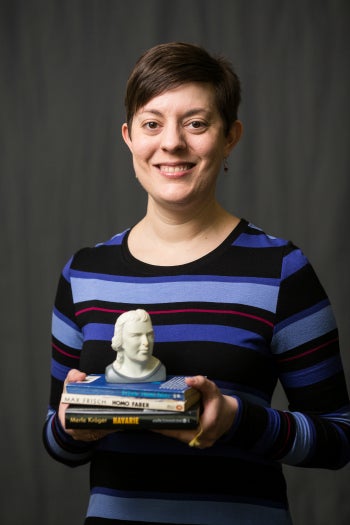Anna Zimmer, Ph.D. (C’08, C’13)
Current position and institution: Assistant Professor, Northern Michigan University
2008/MA, 2013/PhD

What career path did you take to get to where you are today?
After graduating from Georgetown in January 2013, I spent one year working as an instructor for the GUGD, followed by a semester as a sabbatical replacement at Hood College in Frederick, MD. I then spent one year as a Visiting Assistant Professor at Emory University, before being hired into my current position at Northern Michigan University. While I gained a lot of teaching experience at Georgetown, my positions at Hood and Emory afforded me the opportunity to teach at different kinds of institutions and work with a greater variety of students, experiences that have served me well in my current position.
Did you consider other career paths, and if so, what were the crucial factors that influenced your decision?
Yes, I did consider other career paths, as the academic job market is incredibly competitive and there are very few jobs available. However, my desire to pursue a career as a professor of German Studies was unrelenting and I, therefore, kept applying for academic positions in the hopes of continuing to work in higher education. I’m glad I did!
What are the pros and cons of a career in your current field?
I am currently in a tenure-track position at Northern Michigan University, where I teach in three programs: German Studies, International Studies, and Honors. I am so grateful to have the opportunity to teach across disciplines and at all levels of the undergraduate curriculum. I love my work as a professor. It is never dull and allows me to teach, research, and collaborate with students and colleagues.
You are already aware of the cons of higher education!
How did obtaining a graduate degree from the German Department at Georgetown University prepare you for your current position and/or positions that you held in the past?
Earning my Ph.D. from the GUGD prepared me incredibly well for all of my positions. Maintaining an active research agenda was modeled extremely well by my Doktormutter, Dr. Katrin Sieg, and she continues to be my role model when it comes to scholarship. Especially during the dissertation writing stage, Katrin helped me develop my voice and identity as a scholar. In addition, the financial support from the GUGD and the University allowed me to attend conferences, thus offering me the opportunity to share my work and connect with colleagues beyond Georgetown.
The academic positions I’ve held have been teaching-heavy and therefore my preparation in the GUGD, both in courses with second-language acquisitions scholars and in my own classroom where I had the opportunity to hone my teaching skills, was incredibly valuable. GUGD’s multiple literacies curriculum and the general acknowledgment of the inextricable link between form and content have provided me with a solid foundation in teaching German at all levels and have informed my teaching in related disciplines.
Finally, I’d like to note that GUGD’s strong reputation and robust network of alumni have supported me greatly, not only as I’ve been on the job market, but also in my current work. Also, the GUGD’s commitment to involving graduate students in curricular design and revision, assessment initiatives, and job searches offered me the opportunity to see this side of academia and therefore prepared me for many of my current service obligations.
What skills should current graduate students of the German Department acquire before completing their degree, if they want to pursue a career path in your field?
This question is probably more important for those working in other fields, but despite having gained a lot of teaching and curricular design experience at Georgetown, I felt quite overwhelmed when I had to design (several) entire courses on my own. I think students would benefit from designing entire undergraduate courses (or at least units) as part of a graduate seminar. Even during interviews, I was often asked about the kinds of courses I could teach. The more detailed information interviewees can provide, the better!
What surprised you the most about your work when you first started? How is your job different from how you anticipated it to be?
Teaching three classes a semester is exhausting, but incredibly rewarding! I didn’t anticipate collaborating with so many faculty and staff members outside of my department and I’ve been pleasantly surprised by this.
How did you experience the transition from graduate school to a professional career?
This was not an easy transition, not because I wasn’t prepared to work as a professor, but due to the existential crises caused by the academic job market. That said, I felt very well prepared to conduct research and teach in my field.
What were the resources that you found helpful in your search for (non-)academic jobs?
I found it very helpful to speak with GUGD colleagues and mentors, as well as attend the MLA before I was on the market. I was able to attend the MLA in Philadelphia the year before I went on the market myself. I’d suggest this to students if there is one close in order to get a sense of the conference and also to attend panels on the (non-)academic job market.
What other advice would you give to students wanting to break into or establish themselves in your field?
If you really want to be a professor, give the job market a try for at least a couple of years (assuming your personal/familial responsibilities will allow it). Short-term positions have become the norm for recent graduates and one can no longer expect to get a tenure-track position right after graduation. It’s not impossible, but now the exception. My patience and diligence were finally rewarded!